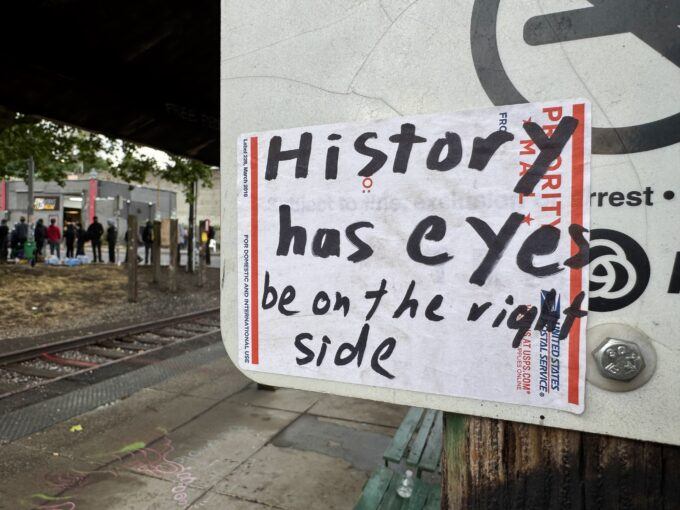
altfacts
Published on http://bad.eserver.org/
HAMLET
Denmark’s a prison.
ROSENCRANTZ
Then is the world one.
HAMLET
A goodly one; in which there are many confines,
wards and dungeons, Denmark being one o’ the worst.ROSENCRANTZ
We think not so, my lord.
HAMLET
Why, then, ’tis none to you; for there is nothing
either good or bad, but thinking makes it so: to me
it is a prison.
“What is now proved was once only imagined,” William Blake writes, affirming his belief in the originating powers of the imagination. But there is a dark side here that matches Hamlet’s assertion that “there is nothing either good or bad, but thinking makes it so.”
We humans have the power to find proof for what we only imagine. Hamlet constrains the constructive power of our “thinking” to good or bad but that has great reach. “Denmark’s a prison” because Hamlet thinks it so. The place is rotten because a regicide has occurred, a very bad act. The macrocosm has gone bad; the State is de-legitimized in Hamlet’s imagination. The order of things can no longer give us proof that its authority is an authority we can respect. And with the absence of an authority we can all join and imagine, think, and know is real and true, we are drawn into madness because of this loss of “the sovereignty of reason.”
All that is solid melts into air, all that is holy is profaned, and man is at last compelled to face with sober senses, his real conditions of life, and his relations with his kind.
The revelation of a “post-truth” world is this: legitimate authority rests not on any absolute and universalizing reasoning that we all recognize but on our own thinking and imagining. We communally concede that this legitimate authority really exists, that its existence is real and true.
This proves to be knowledge, an awareness that confounds and undermines our capacity to accept the legitimacy of any authority or the means and methods of establishment. Once the curtain is pulled back from the Wizard of Oz, neither the Wizard nor his declarations nor Oz itself can ever be the same.
We are now called upon to “get it together” under guiding principles and procedures of verification and validation which are de facto, not de jure, which cannot distance themselves from personal opinions, and therefore from within that chaos of personal opinions, allow us “to get it together” in any civil or political order.
This is distinctly different from the earlier notion of “everything is political” and “the political is personal” in that both the political and the personal remained within or resting upon a shared willingness to recognize the power of reason, of rational and empirical facts and evidence, in both our politics and our personal lives.
What Donald Trump’s entrance into the 2016 Presidential campaign and his so far tenure as President have clearly revealed is that the “post-truth” stage was already set for his entrance and that he, alone among all his challengers, had recognized and exploited the new vulnerabilities of the post-truth age.

Perhaps the reason he has been so prescient and continuously skillful in working the levers here is that the self-inflated grandiosity of his own self has never recognized anything but his own willful determination of what is real and true. He has, in short, never succumbed to verifiable conditions but rather has asserted himself as the agent of post-truth.
How do we recuperate or regain a lost confidence in how we know anything in ways that will not devolve into a clash of opinions?
We are in a situation where we need to trace our cultural footprints back to latent tendencies and dispositions that have led us to a collapse in a consensual recognition of the world we are in, a collapse in our mutual understanding of the same events and words.
Our contemporary priority is no more than an extension of a rooted American individualism standing opposed to the conventions and traditions of Old Europe and the authority of the British Empire. That Frontier spirit of rugged individualism, whose destiny is always away from society, from the restricting demands of the social contract, expands into a monarchy of the personal, from the supremacy of personal choice and freedom to that of personal opinion, empowerment and responsibility.
This expansion, not successfully tempered by any criticism, has been nurtured by an economic ideology which incites a “war of all against all,” pitting each against each and disdaining all notions of mutuality, commonwealth, the public good and the general welfare. Any expression of social solidarity, whether it’s the efforts of workers’ unions or socialist leaning politics attempting to extract the profit motive from enterprises where it has no place — war, education and health care being the most obvious — is denounced as an attack on personal freedom, determination, and responsibility.
We have now in the U.S. pushed everything personal to its end point and provided a medium of transmission in cyberspace for every voice to announce its opinion on every subject. The imagined community of a whole culture, of a whole societal order of things has thus devolved into innumerable online enclaves of shared opinions, no opinion failing to find support, no enclave presenting any credentials of reason, fact, and evidence not at once contested by credentials of alternate reason, fact and evidence.
All authority beyond personal determination has melted into air. That no authority was ever more solid than what our imaginations construed reveals to us that it is this community of imagination that has melted into air.
In the strange way in which an investigating mind discovers much by accident that is linked, I found in the Netflix series The Crown, episodes on Queen Elizabeth II’s ascendancy to the crown, what I call sidebar tutorials on authority bound by tradition threatened by the assertion of personal freedom and individual.
In expressing my recognition of monarchy’s usefulness in preserving an imaginary community of trust in the authority of its institutions, practices, people and words, I found that my point could not find its way through a deep historical American aversion to monarchy but also a contemporary aversion to all expressions of authority presuming to countermand personal will.
Tom Paine settled monarchy’s presumptions.”The Crown” remains for Americans a sham, an obsolete, powerless relic that the British coddled for tourist dollars. But doubtlessly it also represented a link to the 1215 Magna Carta, the Great Charter of the Liberties, to Alfred the Great in the 9th century who defended the kingdom against the Vikings, to, in short, a deep register of an English order whose authority overshadows and overwhelms any present day assertion of personal will and self-empowerment.

The Crown is a solid, abiding in the imagination of its people that does not melt into air. A kind of thinking and imagining that makes any order or authority so, that makes it credible, is strengthened by a present day visible connection, not to a record of individual self-empowerment and opinion but to an historical sustaining of an authorized order of things that has survived into the present.
What I gleaned was that a respect for the regime that a constitutional monarchy created, even one that had extended its power across the globe creating empire and the commonwealth, had deep historical roots that could not be challenged or weakened by any individual action emanating from contemporary priorities.
When the young Queen Elizabeth II asks why she cannot select the secretary she wants rather than the one in line within the order of things in the House of Windsor, she is given a tutorial on order and individuality.
“An order is developed in time, over generations and individuality in the House of Windsor and any departure from that way of doing things is not to be encouraged. . . It results in catastrophes…And it’s in the small things that the rot starts. Do the wrong thing once, it’s easier to do it again. Do the individualistic thing once, it is easy to do it again. The ego, the willfulness, the individualism, the rot sets in.”
The message here is reiterated on two other occasions. When Princess Margaret rebukes her sister for not inserting any personality in her role as Queen, the Queen tells her: “The monarchy should shine. Not the monarch.” Her role as Queen is not to inject instability and drama into an institution that transcends expressions of the personal, caught as they are within the fads and fancies of a present moment.
The Queen also provides a tutorial for Winston Churchill, who has concealed from the Queen a heart attack and thus his incapacity to lead the government. She quotes him a passage from Walter Bagehot on constitutional monarchy:
“There are two elements of a Constitutional Monarchy: the efficient and the dignified. The monarch is the dignified and the government, the efficient. These two institutions only work when they support each other, when they trust each other.”
There is very little at this moment in the U.S. that is either dignified or efficient, though those devoted to the efficiency of the Market no doubt celebrate the Dow Jones breaking the 20,000 mark, as if that was any comfort to some 80% of Americans who are not dividend recipients. And this includes some 45% who remain loyal to most the undignified and inefficient of all U.S. presidents.
What we have in great abundance is division, not into North and South, but an ungraspable fracturing that intensifies as any possibility of a cohering solidarity of imagination weakens.
Lincoln exclaimed:
“A house divided against itself cannot stand. I believe this government cannot endure, permanently, half slave and half free. I do not expect the Union to be dissolved — I do not expect the house to fall — but I do expect it will cease to be divided.”

What he expected would heal the division was an enduring faith he had in a United not a divided States, in a vision of unity built out of separate but equal States, a vision that had been wounded but would be regained.
The forces of cultural and societal cohesion, as well as an imaginary that shapes a community united in common purposes, dreams and ideals have, from the nation’s beginning, been slighted in favor of individual autonomy and a personal will to succeed that mocks mutual aid and interdependence.
Any vision of what the Constitution describes as “the general Welfare” is replaced by a supposedly salutary market driven competition in which winners need losers in order to win, in which the welfare of others is their own concern.
We do not now have a country divided into “half slave and half free” but we do have a country in which 1% have more wealth than the combined wealth of the bottom 95%. Such a seriously divided house still stands though all threads of cohesion are fast dissolving and the authority of all institutions appears false in the eyes of those who see no authority except in themselves.
What is imagined here is not a community of shared values, laws and traditions but one individual, one personality, half-celebrity, half-mogul, who can “deconstruct the administrative State,” the existing order of the Republic, and replace it with a country as each individual wants it to be.
Making America great again is, at bottom, a promise to replace order and authority with individuality and personal choice. This is a promise that has always been at the very center of the American cultural imaginary. America’s freedom from old world Europe established itself here, individual above tradition, the personal above any authority.

Although it seems as if a re-awakened nationalist spirit is sweeping across both the U.S., England and Europe, one which is drawing countries into a restricting, wall building, immigrant excluding/deporting, anti-global, anti-multi-cultural, anti-racial, religious and ethnic diversity intolerance, it is a weakening and dissolving of former integrating and transnational goals not emerging from the same sources or for the same reasons.
There has been little efficiency in the U.S. Congress for a long time and with the election of Donald Trump to the presidency, the executive branch is launching a Twitter attack on prior notions of State efficiency and national dignity, replacing these with a deconstructing chaos.
Trump is himself a personification of capitalism’s deconstruction of not only the power of the State but of all solidarity threatening its own Market rule. This leads to an ironical situation because the anarchic Trump has come to power on a narrowing, nationalistic, anti-global platform, directly opposing capitalism’s globalizing efforts to destroy all national obstacles standing in the way of an unregulated pursuit of profit-without-borders.
The irony deepens when we see that President Trump has placed global market capitalists in all key cabinet positions. Only the naïve remain confused here. Donald Trump will monetize the presidency for his own profit and those he appoints. Both nationalism and transnationalism are to be replaced by one individual. This also a logical extension of the American devotion to self-empowerment and individual autonomy and rule.
The dignified, which Bagehot assigned to the monarchy in Britain’s constitutional monarchy, has, in the U.S. from the very beginning been assigned to individual construction, to a personal formation of a sustaining collective imaginary. That assignment was and remains contradictory; as the impulses of the personal increase, interests in the social, the public, and the collective diminish. Thus, there is no uniting presence of the dignified in the American mass psyche that can in any way temper the inefficiency of the government, namely Trump’s government.
The situation is different with the Brexit vote in England, which detached it from the EU, although its contemporary economy is one of the most globalized in the world.
The efficiency of this globalized economy, however, was not in the case of England complemented by any global imaginary that could replace the dignity of the monarchy. The deep register of traditions that the continuation of the monarchy represented could not extend beyond the home shores. What the British Empire had done to its colonies was implant its own domestic dignity, its own nationalist imaginary among subaltern cultures, now either totally independent or commonwealth affiliates.
What EU rules have done is increase the number of immigrants and refugees into a culture dependent upon the global market but without any cohering imaginary of global acceptance beyond colonization.
If England’s sustaining imagined community rests on the dignity of the monarchy, and all that represents, then what membership in the EU has clearly done is overload to the point of revolt the dignity that binds a nation.
Retreat to national borders is what the Brexit vote represents as an imaginary that has not expanded globally marks boundaries of homeland and “foreigners.” The confinement of a sense of communally shared dignity to what is symbolized in the monarchy marks England’s nationalism above globalism.
In the U.S., there has never been a communally shared dignity but always only the dignity of the individual, personal freedom always in danger of encroachment from any form of solidarity, whether societal or governmental.
The retreat in the U.S. from globalism to nationalism is in regard to globalism, a retreat incited by xenophobia and worse, and in regard to nationalism, not to any consensual vision or understanding but rather to an order in which the personal opinions of each individual rules, what is perceived to be a totally democratized order, within this post-truth imaginary.
That there is really no political order emerging from this fragmenting of a unifying cultural imaginary into a tsunami of liberated Tweeters, although this imaginary has assumed power as of January 20, 2017, is a matter of daily disclosure.

That a man who asserts his own whimsy as reality, who asserts his opinions as facts, and who conflates all things social within his own ego, has become President of this post-truth imaginary, one totally without any cohering dignity, was to be expected.














